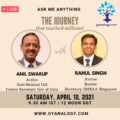To comment or receive more such wisdom, please register on www.gyanalogy.com/login
“In a colossal country like India a solution works only if it is politically acceptable, socially desirable, technologically feasible, financially viable, administratively doable, judicially tenable and emotionally relatable”, says the veteran IAS officer Anil Swarup summing up his dimensional governance framework in a LIVE Ask Me Anything session hosted by Gyanalogy. The veteran bureaucrat with 38 years of experience, he calls the Indian Administrative Services (IAS) as the only service in the world where one can reach out to a large number of helpless people; numbers which one can’t think in any other profession or anywhere else in the world.
During the session, Mr Swarup shared many anecdotes from his career. On the question of survival in IAS, Mr Anil Swarup says, you can perform and exist; you may do nothing but still exist. You may survive if you are honest, you may survive even if you are dishonest. However, ethical behaviour and honesty pay in long run. He shared two incidences from his long career – one in which he failed and one in which he succeeded in saving his subordinates. He mentions that his book Ethical Dilemmas Civil Servant has 70 such incidences, some which today he questions in the hindsight.
While replying to the questions from the live audience, he addressed the point that basic fundamentals of public sector and private sector are same and both should be in harmony to work towards progress of the society. To IAS aspirant student he traces out that how taking challenges ultimately helps in life. He suggests that civil servants should not have expectations from the process or politicians and rather should try to make impact on individual capacity in however small way they can.
On the question of “Where are we getting stuck up in the government: Is it the people or process?”, Mr Swarup summed it as “the Delhi disconnect”. He further explains that residing in Delhi we tend to believe that all the wisdom resides here and may be fundamentally disconnected with the emotionally relatability aspect of his seven dimensional framework which nothing but connect with the people. Quoting an example from his own tenure as the Coal Secretary, he mentioned that he actually went down to the mines to “feel the pulse of the people” because no scheme would work unless the policy makers empathizes with the people who ultimately get impacted by these policies. Drawing parallels between the corporate sector and the public policy sector, he rhetorically asks that although the context is different but if one is not taking care of the consumer, then what is one doing? He illustrates that perhaps in the Lutyens’ Delhi this connect with the clientele is perhaps missing. On the other aspect of process, Mr. Swarup highlights an example from his stint as the Head of the Project monitoring group in 2013 where he was tasked to fast track government projects each worth over 1000 crore INR (130 million USD). He explained how digitalizing the process onto a web portal as opposed to suffocating them under paper files rotting in some government office became an instant mantra for success in an era when no civil servant wanted to commit themselves on any project due to the plethora of scams breaking out. Digitalization brought not just transparency but also efficiency to the system.
Stressing further on transparency, he mentioned that he became Secretary in the coal ministry at a time when the Supreme Court of India cancelled more than 200 blocks allocated since 1993. He successfully conducted coal auctions in a transparent manner, which was a huge success. He added that while we read a lot about coal mafias regularly, when he joined the Education Secretariat he realized that an even bigger mafia is ruling the education system in India. He half-jokingly says that while in coal sector, the mafia is over ground and mining is underground; in the education sector the mafia is underground and has to be mined out. On the other hand, he also talked about good people in education. During his tour to 24 states as Education Secretary he found people like Sandeep Gund who are establishing process to show how the teachers can change the education sector and Gund’s model of digital school got replicated by sixty thousand schools across without any investment from the pocket of government.
Post retirement he is running movement namely Nexus of Good for Connecting Goodness, Spreading Hope, Mercy, Wisdom, and Kindness through Positive Action. He keeps drawing attention to the fact that if the mafias can collude do bad to the human race collectively then why cannot all good people come together to spread good across the world. He talks in detail how he tried doing good in his capacity during his service and what he is doing now.
Two of Mr Swarup’s favorite authors are Rhonda Byrne and Paulo Coelho because of their inspirational and philosophical work. His zeal of doing good gets drawn by the quote of Paulo Coelho “Universe conspires you to achieve something that you want strongly”. The other saying of Rhonda Byrne – Continue to think about what you want; you will bring it into your life.
Mr Anil Swarup acknowledges how his family, most importantly his wife sacrificed while he served the country dedicatedly. How they always were ready for transfers from one place to another because of the tough decisions he sticked on to.

About the Speaker: Mr Anil Swarup is an author and a former Indian Administrative Service Officer. He has served in various key positions for both the Union Government and the Government of Uttar Pradesh. He was the recipient of Director’s gold medal for “best officer trainee” in 1981 batch at the Lal Bahadur Shastri National Academy of Administration and was also a gold medalist for being the “best all-round student” in Allahabad University. He released a few memoirs including the Ethical Dilemmas Civil Servant and Not Just A Civil Servant, and is a regular columnist with leading dailies.



